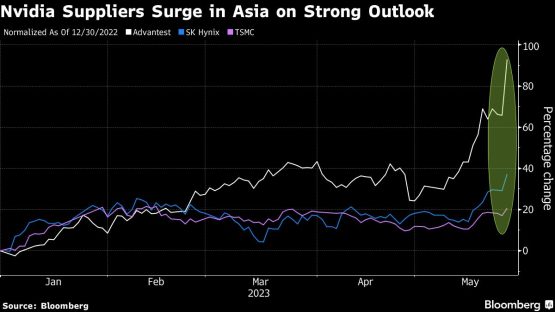US equity futures rallied after a surprise increase in sales forecasts from chipmaker Nvidia Corp. which triggered a rally among its Asian suppliers but failed to lift broader stock benchmarks across the region.
Stock benchmarks in Japan, China, Australia and South Korea all declined. Hong Kong’s Hang Seng Index fell 2%, on course for its worst weekly loss since March, as global investors remained downbeat on Chinese assets.
A rally in Taiwan Semiconductor Manufacturing Co. — which supplies Nvidia – buoyed Taiwanese stocks, bucking the trend in Asia. South Korean tech bellwethers Samsung Electronics Co. and SK Hynix Inc. advanced and in Tokyo equipment supplier Advantest Corp. surged 20% to an all-time high.
Nasdaq 100 futures rallied 1.4% as US equity investors looked beyond news that Fitch had placed the US on ratings watch negative given the debt ceiling uncertainty. The tech-heavy benchmark had fallen 0.5% on Wednesday given the impasse in Washington and uncertainty over the Fed’s next policy decision. Contracts for the S&P 500 jumped 0.4%.
The broader weakness in Asia reflected cross winds as traders contend with the risk of the US defaulting on its debt, the chances of another rate hike by the Federal Reserve, central bank meetings in Seoul and Jakarta, and signs of softness in the Chinese economy.
The dollar strengthened against major currencies, tracking a rise in Treasury yields as investors sold US government bonds as worries over a potential default lingered.
Treasury yields were broadly higher across the curve, adding to their advance Wednesday, after the Fitch news. The ratings agency said the decision reflected the partisan dispute over the debt ceiling but that it still expects a resolution to head off default.
Yields on the two-year and 10-year Treasury notes climbed to the highest level since mid-March, during the depths of the banking crisis. Gold fluctuated and the yen edged lower after both haven assets spiked higher on the Fitch news before unwinding their gains. The yen was hovering just below 140 per dollar and at its weakest since November.
The New Zealand dollar added to recent losses after the central bank indicated Wednesday that its rate-hike cycle had peaked. The won was weaker after the Bank of Korea held rates steady Thursday. The rupiah was also down ahead of a decision from the Bank Indonesia, which was also seen standing pat.
AI impact
Nvidia shares rose by around 25% in after-hours trading following the chipmaker’s report that booming demand for artificial intelligence processors would fuel revenue growth. The action indicated a gain of around $200 billion to its market value.
“The company couldn’t have been more positive about what it’s seeing,” said Adam Crisafulli, analyst and founder of Vital Knowledge media. “In addition to the huge revenue tailwind hitting the company from AI, Nvidia’s gross margins have now largely recovered to prior peak levels.”
In addition to Nvidia and the debt talks, investors were weighing minutes from the Fed’s meeting in early May that showed policymakers leaning toward pausing interest-rate increases in June amid heightened uncertainty over the outlook. Yet the minutes also suggested they aren’t yet ready to call an end to their battle against stubborn inflation.
Other economic headwinds stemming from tighter credit conditions are also not yet reflected in market prices, according to Kim Strand, senior vice president, Franklin Templeton Investment Solutions.
“Our base case is still a recession,” Strand said in an interview on Bloomberg Television. “The rate hike cycle could be over but there is still a lot left in terms of macro economic uncertainty and how that ripples through the economy.”
Key events this week:
- US initial jobless claims, GDP, Thursday
- Interest rate decisions in Turkey, South Africa, Indonesia, South Korea, Thursday
- Tokyo CPI, Friday
- US consumer income, wholesale inventories, durable goods, University of Michigan consumer sentiment, Friday
Some of the main moves in markets:
Stocks
- S&P 500 futures rose 0.4% as of 2:03 p.m. Tokyo time. The S&P 500 fell 0.7%
- Nasdaq 100 futures rose 1.4%. The Nasdaq 100 fell 0.5%
- Japan’s Topix fell 0.4%
- Australia’s S&P/ASX 200 fell 1.1%
- Hong Kong’s Hang Seng fell 2.2%
- The Shanghai Composite fell 0.6%
- Euro Stoxx 50 futures were little changed
Currencies
- The Bloomberg Dollar Spot Index rose 0.2%
- The euro fell 0.1% to $1.0736
- The Japanese yen was little changed at 139.56 per dollar
- The offshore yuan fell 0.2% to 7.0824 per dollar
Cryptocurrencies
- Bitcoin fell 0.7% to $26 221.04
- Ether fell 1.4% to $1,778.87
Bonds
- The yield on 10-year Treasuries was little changed at 3.75%
- Australia’s 10-year yield advanced four basis points to 3.69%
Commodities
- West Texas Intermediate crude fell 0.2% to $74.21 a barrel
- Spot gold was little changed
© 2023 Bloomberg

